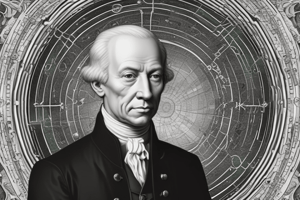Podcast
Questions and Answers
According to STA, what does synderesis refer to?
According to STA, what does synderesis refer to?
- The study of moral principles through reason and reflection
- The inherent capacity of every individual to distinguish good from bad (correct)
- The immediate judgment of practical reason applying general principles of morality
- The divine law expressed in human nature
Which view believes that the moral law is the dictate of the voice of reason?
Which view believes that the moral law is the dictate of the voice of reason?
- Duty of self-improvement
- Ross's Twofold principle
- Intuitionism (correct)
- Duty of compensation
What is the ultimate source of the natural moral law according to the text?
What is the ultimate source of the natural moral law according to the text?
- Divine wisdom and God's eternal law (correct)
- Human nature
- Cultural norms and values
- Scientific discoveries
Which determinant determines the rightness or wrongness of a concrete individual human act?
Which determinant determines the rightness or wrongness of a concrete individual human act?
According to Thomistic Ethics, where does the natural moral law find its foundation?
According to Thomistic Ethics, where does the natural moral law find its foundation?
Which concept views good as built into human nature and directs individuals by their natural inclination?
Which concept views good as built into human nature and directs individuals by their natural inclination?
According to Joseph Fletcher's Situation Ethics, which of the following is a key characteristic of the Legalistic/Normative approach to morality?
According to Joseph Fletcher's Situation Ethics, which of the following is a key characteristic of the Legalistic/Normative approach to morality?
According to Situation Ethics, which type of love is considered 'invincible' and can hardly be removed even with extra effort?
According to Situation Ethics, which type of love is considered 'invincible' and can hardly be removed even with extra effort?
What is the key characteristic of the Antinomian approach to morality according to Joseph Fletcher's Situation Ethics?
What is the key characteristic of the Antinomian approach to morality according to Joseph Fletcher's Situation Ethics?
According to Situation Ethics, what is the role of moral relativism?
According to Situation Ethics, what is the role of moral relativism?
What is the role of the 'moral faculty' according to Joseph Fletcher's Situation Ethics?
What is the role of the 'moral faculty' according to Joseph Fletcher's Situation Ethics?
What is the preferred approach to morality according to Joseph Fletcher's Situation Ethics?
What is the preferred approach to morality according to Joseph Fletcher's Situation Ethics?
According to Kant, what determines the rightness or wrongness of an action?
According to Kant, what determines the rightness or wrongness of an action?
In Kant's view, what makes an act moral as distinguished from a non-moral one?
In Kant's view, what makes an act moral as distinguished from a non-moral one?
What does Kant believe about acting morally?
What does Kant believe about acting morally?
In Kant's view, what distinguishes a moral person from a non-moral one?
In Kant's view, what distinguishes a moral person from a non-moral one?
What aspect of an action does Kant prioritize over its consequences?
What aspect of an action does Kant prioritize over its consequences?
According to Kant, what is the essence of morality based on?
According to Kant, what is the essence of morality based on?
Flashcards are hidden until you start studying





